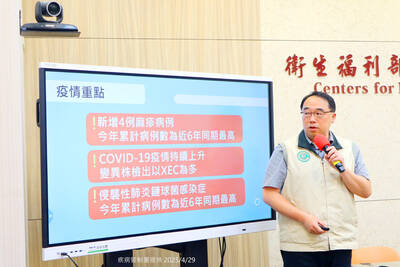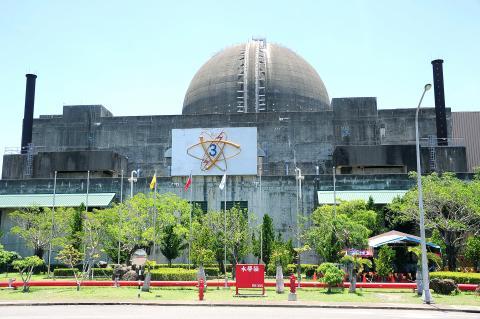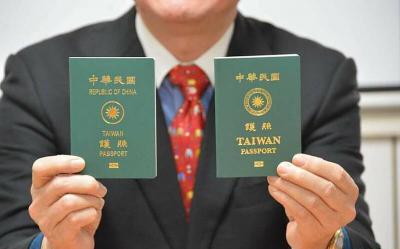Following the pattern of pan-green camp integration in Taipei, Democratic Progressive Party (DPP) New Taipei City mayoral hopeful Yu Shyi-kun (游錫堃) and Taiwan Solidarity Union (TSU) hopeful Lin Chih-chia (林志嘉) engaged in a televised debate yesterday ahead of a public opinion poll on Thursday to determine the final pan-green camp candidate in the November election.
The contenders talked about their vision for the nation’s largest constituency, which has a population of 3.96 million, in a televised debate yesterday at Formosa Television in the last push of their campaigns before the poll, where they would each be matched against New Taipei City Mayor Eric Chu (朱立倫).
Win or lose, the one with the better record against Chu would be the final pan-green camp candidate. The same process in Taipei was used to select independent aspirant Ko Wen-je (柯文哲) over the DPP Legislator Pasuya Yao (姚文智) as the pan-green camp candidate earlier this month.

Photo: Chang Chia-ming, Taipei Times
Yu, a former premier, highlighted his rich experience and the success of governance — he served as Yilan commissioner for eight years and premier for three years — as his strength over Chu, who Yu said has never been serious about city affairs, but had his eyes on a bigger prize — the presidency.
In the 60-minute televised debate, the 65-year-old focused on his “1453” social housing policy, a plan for a NT$100 billion (US$3.33 billion) fund that would build 50,000 affordable apartments in four years to rent for about NT$300 per ping.
Yu pledged to transform New Taipei City into a multiple-core metropolis free of corruption and a city where young people could afford a house at a reasonable price, stressing that he would improve government efficiency.
Lin, 55, summed up his campaign platform as “54321,” meaning the pledges of a “five rings” mass rapid transit system, as supposed to Chu’s failed promise of a “Three Rings and Three Lines” system, four strategic industries of baseball, gaming, animation and robots, development of mountain, sea and rivers, two “Made-in-Taiwan” shopping malls and “One Borough, One Characteristic.”
“I’ve never left New Taipei City and I can say that my heart is always here. And I’m confident that no one understands this place better than I do, which is why I have full confidence that I would be able to beat Chu in the election. All I want is the opportunity,” Lin said.
Lin lost the Taipei County commissioner election in 1997 as a Chinese Nationalist Party (KMT) candidate and failed to win the KMT’s nomination in 2001.
The second head-to-head platform presentation is scheduled to be held at Sanlih Television on Wednesday.

A fugitive in a suspected cosmetic surgery fraud case today returned to Taiwan from Canada, after being wanted for six years. Internet celebrity Su Chen-tuan (蘇陳端), known as Lady Nai Nai (貴婦奈奈), and her former boyfriend, plastic surgeon Paul Huang (黃博健), allegedly defrauded clients and friends of about NT$1 billion (US$30.66 million). Su was put on a wanted list in 2019 when she lived in Toronto, Canada, after failing to respond to subpoenas and arrest warrants from the Taipei District Prosecutors’ Office. Su arrived at Taiwan Taoyuan International Airport at 5am today on an EVA Air flight accompanied by a

COVID-19 infections have climbed for three consecutive weeks and are likely to reach another peak between next month and June, the Centers for Disease Control (CDC) said yesterday. Weekly hospital visits for the disease increased by 19 percent from the previous week, CDC Epidemic Intelligence Center Director Guo Hung-wei (郭宏偉) said. From Tuesday last week to yesterday, 21 cases of severe COVID-19 and seven deaths were confirmed, and from Sept. 1 last year to yesterday, there were 600 cases and 129 deaths, he said. From Oct. 1 last year to yesterday, 95.9 percent of the severe cases and 96.7 percent of the deaths

Restarting the No. 2 reactor at the Ma-anshan Nuclear Power Plant would take up to 18 months, Minister of Economic Affairs J.W. Kuo (郭智輝) said today. Kuo was answering questions during a meeting of the Legislative Yuan’s Economics Committee, where legislators are considering amendments to the Renewable Energy Development Act (再生能源發展條) amid concerns about the consequences of the Pingtung County reactor’s decommissioning scheduled for May 17. Its decommissioning is to mark the end of Taiwan’s nuclear power production. However, Chinese Nationalist Party (KMT) lawmakers have proposed an amendment to the Nuclear Reactor Facilities Regulation Act (核子反應器設施管制法) that would extend the life of existing

The Ministry of Foreign Affairs yesterday demanded that Somalia reverse its decision prohibiting Taiwanese passport holders from entering or transiting through the country. Somalia said it is following the “one China” principle based on UN Resolution 2758. The ministry said that Somalia is misinterpreting the resolution under China’s instigation, creating a false impression that Taiwan is subordinate to China. The Somali Civil Aviation Authority told airlines on Tuesday last week that starting today, any passengers with passports or travel documents issued from Taiwan or its affiliated institutions would not be allowed to enter or transit through Somalia. The decision comes as Taiwan is boosting